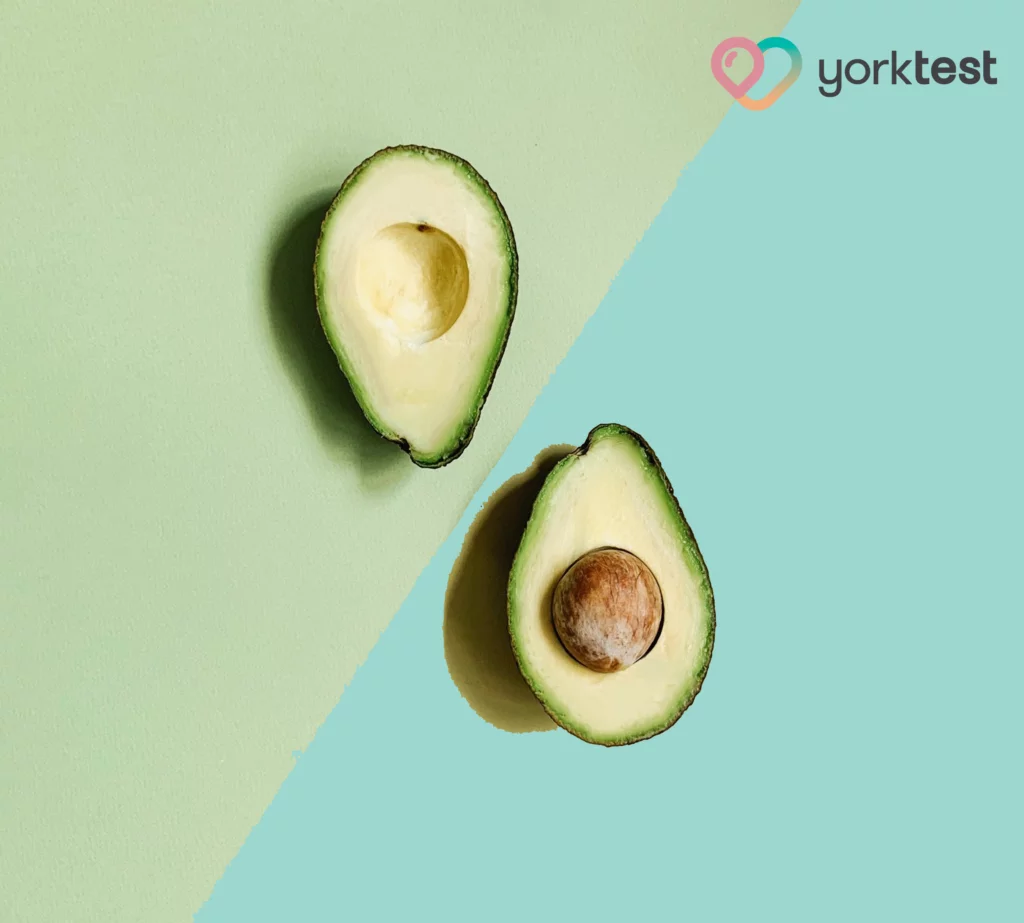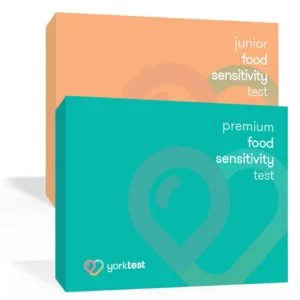- Avocado Allergy: Symptoms, Types, Testing, & Management
- What is an Avocado Allergy?
- Avocado and Latex Allergy
- Avocado and Oral Allergy Syndrome (OAS)
- Avocado Histamine Levels
- Avocado Intolerance vs. Allergy
- Avocado Allergy Symptoms
- Can You Suddenly Become Allergic to Avocado?
- Avocado Allergy Test
- Avocado Allergy Cross Reactivity
- What About Avocado Oil or Other Avocado-based Products?
- How To Overcome Avocado Allergy
- Are You Allergic to Avocado?
Avocado Allergy: Symptoms, Types, Testing, & Management
Allergies can be triggered by a wide variety of foods, including certain fruits and vegetables. One vitamin-rich food that can be a culprit for such allergies is avocado. While avocado allergy is not frequently reported, it can cause a range of adverse reactions that can make it difficult to diagnose, let alone understand.
Furthermore, there’s a significant cross-over between having an avocado allergy and being allergic to other foods and substances, including latex. In turn, avocado allergies can be complex conditions that are difficult to pinpoint unless properly tested. It’s also an allergy that’s implicit in a range of adverse reactions, including oral allergy syndrome and latex-fruit syndrome
If you’re allergic to avocado or suspect that you might be, it’s important to know the symptoms, types of avocado allergies, how to get tested, and how to best manage the allergy to avoid a trigger. In this post, we discuss all of these matters and more.

What is an Avocado Allergy?
Unlike food sensitivity or intolerance which can have similar symptoms as food allergies, a true avocado allergy occurs when the body’s immune system responds to the food as if it were a foreign invader.
Compared to other food allergies like soy or peanut allergies, avocado allergies are known to be relatively rare. But what makes this condition unique is that an individual can be allergic to avocados through a number of mechanisms, most commonly an oral allergy or a latex allergy.
We go into further detail about these forms of allergies, but in brief, the types of allergic reactions to avocado often involve:
- Latex-Fruit Syndrome – As the most common source of avocado and other food allergies, latex-fruit syndrome is characterized by foods (and natural latex itself) that have a protein molecule responsible for the allergenic trigger.1
- Oral Allergy Syndrome – Often the culprit of cross-reactivity, such as with exposure to birch tree pollen, this condition is not considered a true allergy but produces allergy-like symptoms, like swelling of lips and tongue.
- High Histamine – Avocado is considered a food with very high levels of histamine. Such foods can intensify the release of histamine in the body, thereby triggering allergy symptoms.
- Anaphylaxis – While extremely rare, anaphylaxis is a severe allergic response that can lead to IgE mast cell degranulation, which can cause severe and even life-threatening symptoms.
Depending on your situation, skin prick testing and specific IgE blood testing can help test for avocado and determine your condition. Below we go into further detail about these allergy types, cross-reactivities, and precautions.
Avocado and Latex Allergy
If you have a latex allergy or have been diagnosed with latex-fruit syndrome, you may want to avoid eating avocados altogether. About 30-50% of individuals who are allergic to latex are also hypersensitive to certain plant-based foods.2 Avocado contains a protein that is similar to the protein found in latex. Symptoms of a latex allergy include itching, swelling, and difficulty breathing.
If you have a latex allergy, you may also be allergic or cross-reactive to other fruits and vegetables. Such foods include bananas, chestnuts, kiwifruit, passionfruit, papaya, and several others. If you are allergic to latex, talk to your physician about which foods to avoid.
Avocado and Oral Allergy Syndrome (OAS)
An oral avocado allergy is a condition in which your body reacts to the food as if it were a harmful substance or invader. This reaction is triggered by your immune system and the outcome can result in mild or severe allergy symptoms, such as itching of your lips, mouth, and throat. While oral allergy syndrome is not common, it can be a serious condition that shouldn’t be taken lightly.
If you think you might have an oral avocado allergy, the best thing to do is see an allergist or physician for testing. Once you determine the fruit to be problematic, they can help you develop a plan to avoid avocados and other foods that might trigger your symptoms. With careful management, you should be able to enjoy a variety of foods without fear of reaction.
Avocado Histamine Levels
Histamine is a molecule that is involved in many different biological processes. It is found in many body tissues and is essential for proper immune function. Histamine is also a key mediator of inflammation.
While histamine is necessary for proper health, too much histamine can lead to problems. High levels of histamine can cause an allergic reaction, known as histamine intolerance. Symptoms of histamine intolerance include itching, hives, swelling, difficulty breathing, and gastrointestinal upset.
Avocados are naturally very high in histamine and such high levels can be problematic for people with histamine intolerance. If you suspect that you may have histamine intolerance, it is best to avoid foods high in histamine, such as avocados. Avocados also contain other allergens that may trigger reactions in people who are sensitive to them. Some of these allergens include latex, sulfites, and copper.
Avocado Intolerance vs. Allergy
There is a significant biological difference between an avocado intolerance and an allergy. In simple terms, an allergy to avocados is immuno-related and can be life-threatening in extreme conditions, while intolerance is generally characterized by uncomfortable reactions but not overly harmful or dangerous.
An intolerance to avocados is much more common than an allergy. Symptoms of avocado intolerance include bloating, gas, diarrhea, and nausea. If you have an intolerance to avocados, you may be able to eat small amounts or certain avocado-containing products without experiencing any symptoms. However, it is often best to avoid eating avocados altogether if you have an intolerance.
Avocado allergies, on the other hand, are rare but can cause a host of reactions. If you do in fact have an avocado allergy, you should avoid eating avocados and any products that contain them.
Avocado Allergy Symptoms
The symptoms of an avocado allergy can vary from person to person as well as the nature of their condition. Common symptoms of an oral allergy to avocados include:
- Scratchy throat
- Swelling in and around the mouth and throat
- Itchy mouth
As with latex-avocado allergy, the symptoms can include:
- Swelling of the lips
- Sneezing
- Stomach discomfort
- Hives
- Anaphylactic response
- Itchy eyes
There are two types of symptomatic reactions that can occur: immediate and delayed. Immediate reactions happen within minutes of eating the fruit, while delayed reactions can take up to 48 hours to develop.
If you experience any of these symptoms after eating avocados or handling them, it’s important to seek medical attention immediately. Anaphylactic reactions can be life-threatening, so it’s critical to get emergency help if you suspect you may be experiencing one.
Can You Suddenly Become Allergic to Avocado?
Yes, you can develop an allergy to avocados despite not having any problems with them in the past. Allergies can develop at any time, and there are a few known causes for why someone might suddenly become allergic to avocados.
One possibility is that the person has developed a cross-sensitivity to another allergen, such as latex or birch tree pollen. When this happens, the body mistakes the proteins in avocado for the proteins in the other allergen, and an immune response is triggered.
Another possibility is that the person has developed oral allergy syndrome (OAS). This condition is caused by a reaction between certain fruits or vegetables and pollen, and it can cause symptoms like itching or swelling in the mouth when the fruit or vegetable is eaten. Avocados are known to trigger OAS in people who are allergic to birch pollen or ragweed pollen.
Avocado Allergy Test
If you suspect you have an allergy to avocados, having a proper food allergy test done is an important measure to rule out an avocado intolerance or sensitivity, as the symptoms of the latter can be similar. There are two common avocado allergy test methods: a skin prick test and an IgE blood test. The latter can easily be done with a home-to-laboratory allergy test kit to help determine whether or not you have an IgE reaction to avocadoes.Â
Often the most common allergy test in clinical settings is a skin prick test. If you visit a physician, this is likely the test you’ll receive to diagnose an avocado allergy. With this type of allergy test, a needle is used to make a small prick in the skin and a very small amount of the allergen is placed on the skin. If symptoms like redness, skin rash, itchiness, and bumps develop, an allergy can be confirmed.
Alternatively, an IgE blood test is a simple and effective alternative to test for an avocado allergy. This type of blood test is used to measure the level of allergen-specific IgE antibodies found in the blood. In short, it can be used to confirm an avocado allergy or help rule one out.
’You can also have an avocado sensitivity which is very different from avocado allergy and an avocado sensitivity  test can done at home with a lab-accredited test kit, like that of YorkTest’s easy-to-use Home-To-Laboratory Test Kit.
Avocado Allergy Cross Reactivity
It’s possible to be allergic or sensitive to avocados, even if you’ve never eaten them before. This is because of a phenomenon called cross-reactivity.
Cross-reactivity occurs when your body mistakes a protein in one food for a similar protein in another food. In the case of avocados, the proteins that cause an allergic reaction are similar to those found in latex but are also present in other foods.3
Latex allergies are relatively common, and people who are allergic to latex are often also allergic to avocados. Other foods that can cause cross-reactivity with avocados include bananas, kiwis, and chestnuts.
If you’re allergic to avocados, you may experience symptoms such as itching, swelling, and difficulty breathing. In severe cases, anaphylaxis may occur, especially in cases of avocado hypersensitivity.4 Anaphylaxis is a life-threatening reaction that requires immediate medical attention.
Cross-reactivity between avocados and other foods is relatively uncommon, but it’s still important to be aware of the potential for an allergic reaction. If you have any questions or concerns, be sure to talk to your allergist.
What About Avocado Oil or Other Avocado-based Products?
If you’re among the small percentage of people who are allergic to avocados, you may wonder if it’s safe to consume other products like avocado oil. In most cases, no, it’s not safe to consume these foods as many allergic individuals will experience the same adverse flare-ups.
However, some avocado-based products that have been heat-treated, like cooking oils, might be okay to consume for some individuals. The heat-treated process during the production of these oils may destroy the allergenic proteins, however, this is highly individual and doesn’t always pertain to everyone with such allergies.
Some examples of heat-treated avocado products include avocado oil and select avocado spreads and guacamoles. Bear in mind that this isn’t the case for all products, so be sure to thoroughly read product labels.
How To Overcome Avocado Allergy
If you do have an allergic reaction to avocados, your physician or dietician can work with you to figure out the best way to manage your allergy. Unfortunately, there is no specific avocado allergy treatment that will cure your symptoms entirely. However, your physician may recommend that you take antihistamines to help relieve symptoms in the instance of exposure.
There are a few measures you can take to help overcome your avocado allergy. In cases of extreme reactions, the underlying strategy may involve avoiding avocados completely or taking steps to reduce your risk of exposure. One common measure is always carrying emergency medication with you in case you accidentally consume something that contains avocado, like guacamole or a smoothie containing avocado.
If over-the-counter medication products don’t provide relief, your healthcare provider may prescribe stronger or alternative medication to accommodate your individual needs. If you have a severe reaction after eating avocados, such as anaphylaxis, you will need immediate medical attention and an injection of epinephrine to treat the symptoms.
Anaphylaxis is a life-threatening reaction that can cause difficulty breathing, swelling of the throat and tongue, and a drop in blood pressure. If you have any of these symptoms, it is important to seek medical attention immediately.
Are You Allergic to Avocado?
It is important to be aware of the symptoms of an avocado allergy and to know how to identify the different types of reactions. If you’ve been feeling a little under the weather, sneezing a lot, or have itchy eyes – and notice these symptoms after consuming something with avocado as an ingredient – it’s important to get tested to effectively pinpoint an avocado food allergy.Â
There are a few solutions available for those who are allergic to avocados, so the best way to minimize the risk of a reaction is to avoid eating avocados altogether. If you have been diagnosed with an avocado allergy or other cross-reactive food allergies, it can be a safe precaution to carry an EpiPen with you in case of a highly severe or even life-threatening reaction. And as always, check with your physician or dietician about consuming certain foods in question, as even a small amount of avocado can trigger an adverse reaction in some people.
References
1. Lavaud, F et al. “Allergy to latex, avocado pear, and banana: evidence for a 30 kd antigen in immunoblotting.†The Journal of allergy and clinical immunology vol. 95,2 (1995): 557-64. doi:10.1016/s0091-6749(95)70318-7
2. Wagner, S, and H Breiteneder. “The latex-fruit syndrome.†Biochemical Society transactions vol. 30,Pt 6 (2002): 935-40. doi:10.1042/bst0300935
3. Seitz CS, Pfeuffer P, Raith P, Bröcker EB, Trautmann A. Food allergy in adults: an over- or underrated problem? Dtsch Arztebl Int. 2008 Oct;105(42):715-23. doi: 10.3238/arztebl.2008.0715. Epub 2008 Oct 17. PMID: 19623294; PMCID: PMC2696973.
4. Blanco, C et al. “Avocado hypersensitivity.†Allergy vol. 49,6 (1994): 454-9. doi:10.1111/j.1398-9995.1994.tb00839.x











